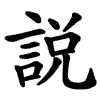説
| ||||||||
Translingual
| Stroke order | |||
|---|---|---|---|

| |||
| Traditional | 說 |
|---|---|
| Shinjitai | 説 |
| Simplified | 说 |
Han character
説 (Kangxi radical 149, 言+7, 14 strokes, cangjie input 難卜口金口 (XYRCR) or 卜口金口山 (YRCRU), composition ⿰訁兑)
Derived characters
Related characters
- 說 (Traditional form used in Taiwan, also the orthodox form in Kangxi dictionary)
Usage notes
説 is not encoded in the Big5 character set for traditional Chinese characters.
References
- Kangxi Dictionary: not present, would follow page 1165, character 5
- Dai Kanwa Jiten: character 35556
- Hanyu Da Zidian (first edition): volume 6, page 3979, character 3
- Unihan data for U+8AAC
Chinese
Definitions
| For pronunciation and definitions of 説 – see 說 (“to say; to speak; to explain; etc.”). (This character is a variant traditional form of 說). |
Usage notes
This character is the preferred form used in Hong Kong. It is also the traditional form of 说 used in mainland China.
Japanese
| 説 | |
| 說 |
Kanji
(Fourth grade kyōiku kanji, shinjitai kanji, kyūjitai form 說)
Readings
From Middle Chinese 說 (MC sywet); compare Mandarin 說 / 说 (shuō):
From Middle Chinese 說 (MC sywejH); compare Mandarin 說 / 说 (shuì):
From Middle Chinese 說 (MC ywet); compare Mandarin 說 / 说 (yuè):
From native Japanese roots:
- Kun: とく (toku, 説く, Jōyō)、よろこぶ (yorokobu, 説ぶ)、よろこばしい (yorokobashii, 説ばしい)
- Nanori: あき (aki)、かぬ (kanu)、かね (kane)、こと (koto)、さとし (satoshi)、つぐ (tsugu)、とき (toki)、とく (toku)、のぶ (nobu)、ひさ (hisa)
Compounds
- 説明 (setsumei): an explanation; to explain
- 説得 (settoku): persuasion, persuade
- 説得力 (settokuryoku): persuasive force, persuasiveness
- 逆説 (gyakusetsu): a paradox
- 仏説 (bussetsu): the sayings or teachings of Buddha
Etymology
| Kanji in this term |
|---|
| 説 |
| せつ Grade: 4 |
| kan'on |
| Alternative spelling |
|---|
| 說 (kyūjitai) |
From Middle Chinese 說 (MC sywet).
Pronunciation
Noun
References
Korean
Hanja
説 • (seol, se, yeol) (hangeul 설, 세, 열, revised seol, se, yeol, McCune–Reischauer sŏl, se, yŏl, Yale sel, sey, yel)
- This term needs a translation to English. Please help out and add a translation, then remove the text
{{rfdef}}.
Vietnamese
Han character
説: Hán Nôm readings: thuyết, thót, thốt
- This term needs a translation to English. Please help out and add a translation, then remove the text
{{rfdef}}.